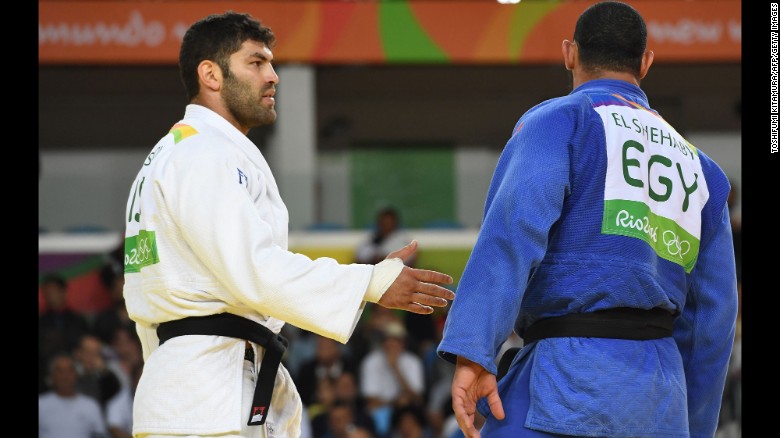Earlier that day, fellow Israeli Gili Cohen -- bronze medalist in the women's half-lightweight division -- had also stood by solemnly as the IJF's flag was raised.
"No Israeli anthem or flag. A disgrace to the spirit of sports," posted the Embassy of Israel in the US. " A disgrace to the spirit of sports."
"It's an outrage," tweeted Emmanuel Nahshon , Israel's Foreign Ministry Spokesman. "Blatant hypocrisy. Shameful."
The UAE embassy in London and the UAE government did not immediately respond to CNN's request for comment.
The IJF, for its part, contacted the president of the UAE Judo Federation insisting "all delegations, including the Israeli delegation, shall be treated absolutely equally in all aspects, without any exception," according to a letter obtained by the Associated Press.
Principle 4 of the Olympic Charter outlines that "the practice of sport is a human right," adding "every individual must have the possibility of practicing sport, without discrimination of any kind."
But this is not the first time sport and politics have met on the tatami (judo mat).
At the Rio 2016 Olympics, Egypt's Islam El Shehaby provoked outrage across the sporting community after refusing to shake hands with Israeli judoka, Or Sasson.
Judo's moral code, created by the sport's founder Jigoro Kano, preaches a set of ethics encouraging friendship, courage and honor.
Yasuhiro Yamashita, considered by many to be the greatest judoka ever, said earlier this month: "Judo is a bridge that connects the world's people, cultures and countries," adding "in this fragile world, judo gives us hope to overcome the obstacles of political tension, animosity and discrimination."
Having beaten Rashad Almashjari of the UAE in the first round of the middleweight division, a second male Israeli judoka, Tohar Butbul, beat Italian Olympic champion Fabio Basile for bronze later on Friday.
Soure: CNN

